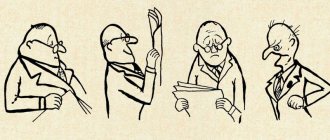At different stages of the development of psychiatry, psychasthenia, or psychasthenic syndrome, was classified in various ways, from mental disorders to character anomalies. Now most scientists are inclined to believe that psychasthenia is a type of neurosis. From Greek this word is translated as “spiritual weakness.”
- Symptoms of psychasthenia
- How does psychasthenia manifest?
- Reasons causing psychasthenia Factors causing psychasthenia
- Psychasthenic personality type in children
- In teenagers
- In adults
It's all about experiences
Psychasthenics worry about everyone: for themselves, for their family and friends, for friends, for others, for work.
And this anxiety affects their behavior and their lives; it seems to consume them, forcing them to refuse everything new. Because of this anxiety, they may not even travel outside the city, or even outside the country. Of course, deep down, many psychasthenics understand this, but cannot admit their fears to themselves.
It’s easier for psychasthenics when they are in a fictional world, where everything is fine, the way they want and they don’t have to solve any problems.
Causes of the condition
Most often, psychasthenic individuals grow up in families where the parents have a similar type of accentuation. Children adopt behavioral characteristics and/or inherit them.
The reasons for constantly being in this state are:
- stress is one of the problems of a resident of a modern metropolis - in order to survive, he is forced to work a lot and hard, this “shocks” our central nervous system;
- nervous and physical overstrain - it is caused by living at the limit of one’s capabilities, when there is no room left for rest and relaxation;
- lack of sleep and lack of sleep - normal functioning of the nervous system is ensured thanks to quality rest, if it is absent, then pathological changes occur in the body;
- lack of physical activity - this factor is also typical for residents of modern megacities;
- lack of vitamins and improper nutritional system, eating on the go, fast food, an abundance of fatty and fried foods, sweets.
- bad habits – one of the most powerful effects alcohol and drugs have on the nervous system, “giving” a person various mental illnesses;
- diseases of the nervous and endocrine system;
- problematic environmental situation - it not only weakens health, but is also a factor that increases the risk of nerve diseases.
Calm, just calm...
Psychasthenics also cannot withstand prolonged psychological stress and stress, so their nervous system is considered weak.
Outwardly, psychasthenics are calmer than other character types. Their body movements are minimized, facial expressions and gestures too. They themselves are inactive, and generally unnoticeable to others, which is most acceptable for them.
Psychasthenics prefer to dress in gray colors and their possible shades. Also, because of their suspiciousness, they can be squeamish and timid.
Treatment
Therapy for emerging disorders includes:
- reduction of risk factors - inclusion of normal nutrition, healthy sleep, reduction of nervous stress;
- taking vitamins;
- sedatives;
- hypnotic;
- antidepressants;
- neuroleptics.
An important element of treatment is psychotherapy. For psychasthenia, the method will reduce the likelihood of more serious diseases of the nervous system. Regular conversations with the doctor will relieve the patient of unnecessary anxiety and worry.
Heredity
Mistrust since childhood
Most often, psychasthenic character traits are inherited and do not depend on upbringing and communication with adults.
Or this type of character is developed in a child when both parents are also psychasthenics, then the child simply adopts the example of behavior from the parents.
Initially, psychasthenics perceive everything new very painfully and with caution, but if something new is inevitable, then they get used to it and it becomes easier for them.
Closedness
Timid, pushes himself into limits
Psychasthenics try to provide themselves with the minimum necessary for life and not let anyone or anything unnecessary into their lives.
It is very difficult to gain the trust of a psychasthenic, because before trusting anyone, he will study the person from head to toe.
Such people are very reserved and uncommunicative, and often analyze their actions, because it is important for them not to make a mistake.
This fear of making a mistake is always present, and what if they do something wrong, but they often cannot explain what will happen in this case.
How to communicate with psychasthenics
Constant concern
It is very difficult to talk with people who worry about everything; any pressure from the interlocutor drives them into even greater stress and worry.
If you are forced to communicate with people of this type of personality, then try to be calm around them, do not make sudden movements, do not “press” when talking, do not insist strongly on anything.
Give them the initiative in the conversation, listen more yourself. If you want to get into the circle of trust of a psychasthenic, show sincere interest in him and his problems. But remember that they are afraid of quarrels and conflicts, since it is difficult for them to show their emotions to the people around them.
Consequences
Under the influence of the above factors, the condition may worsen. One of the possible consequences is psychasthenic psychopathy (anancastic disorder). Such people are suspicious; they are constantly in the process of “internal work” - analysis, thinking about situations (sometimes fictitious). They get down to business, being confident in advance of their failure, although the end result in most cases is above average. Their pedantry, anxiety and susceptibility to phobias are too exaggerated. These patients are often diagnosed with obsessive-compulsive disorder.
Another scenario is the appearance of an anxiety disorder. Such a person is very impressionable and unsure of himself. Pedantry is manifested in building a whole world of rules and prohibitions around oneself. Constantly check these settings. Any (even minor) pain in the body can become a reason to “inflate” a big problem. They avoid contact with people due to fear of ridicule and timidity.
Fear of responsibility
It is also important to know that psychasthenics avoid any responsibility that scares them.
Of course, they can take responsibility for someone or something, but at the same time they can get scared and refuse it under any pretext. But, despite this, psychasthenics are efficient and do everything that their superiors order. If you need a person who will do everything you order him and not take on serious responsibility, then feel free to hire a person with a psychasthenic type of character - he will turn out to be your indispensable assistant.
Cycloid
In some respects, cycloids are similar to labile patients. However, the change in mood among the former is much more pronounced. In their development, mood and emotional background go through two phases:
- Hyperthymic. At this time the mood is elevated, even too high.
- In the second phase, subdepression is observed. Decreased emotional background.
In this respect, cycloid people are similar to patients with manic-depressive psychosis. But accentuation is not a disease. This is a premorbid state of personality. By the way, these patients are more likely to develop bipolar affective disorder. Although there is no 100% correlation.
Among the characteristic features of accentuation:
- Sudden mood changes. They may be perceived as characteristics of an unbalanced personality, which is actually not the case. Each phase, be it subdepression or hyperthymia, lasts for several weeks. Then they are replaced by reverse features.
- Excitability. Increased excitability is typical for the hyperthymic phase. A person at this time is active, energetic, ready to move mountains almost literally. Efficiency is off the charts.
- Friendliness and increased sociability in the hyperthymic phase. In this respect, the patient is similar to classic hyperthymic.
- Irritability. Develops against the background of the subdepressive stage of emotional development. At this time, it is better not to touch the person, since biased criticism and conflicts are possible.
- Aggressiveness. Depending on the type of character, it can turn into physical violence. Or, at a minimum, attempts to protect yourself from uncomfortable communication.
- Increased tearfulness.
The cycloid type is active in the hyperthymic phase. It is at this time that he is most active. In some cases, mood changes do not come for months.
Psychasthenics at work
Integrity is a hallmark
Psychasthenics do everything on time and correctly, because they are afraid of punishment for their mistakes, they are afraid to argue with those who are stronger than them.
But there is also one thing: psychasthenics will not try to do something better, they will do everything the same, no better, no worse, because in both cases they can attract undue attention from their superiors and other work colleagues, and This is what they want least of all.
Also, psychasthenics rarely change jobs, and most likely, if you hire a person with a similar type of character as your assistant, he will serve you faithfully for a very long time.
It is also good that they are completely immersed in work and try not to participate in gatherings of other colleagues, in their conversations and conflicts. This way you can be sure that your secrets will remain secrets to others, because even if a psychasthenic talks to someone, he will be afraid to reveal your secret, because this could lead to a conflict with you.
Symptoms of psychasthenia
Characteristic manifestations of psychasthenia are changes in the patient’s character.
- Anxiety. Moreover, a psychasthenic can be convinced that the cause for alarm is insignificant, and calm him down for a short time. But he will immediately find another reason for worry.
- Excessive sensitivity. Any little things, someone's sidelong glance, a not very polite word, become a reason for frustration.
- As a result, a person begins to avoid and fear communication with strangers, preferring to communicate with those whom he knows well.
- Concentration of attention decreases due to fixation on internal experiences. A person makes mistakes that reduce self-esteem and trigger a new round of self-doubt. Knowing his lack of composure, the patient is forced to double-check everything many times.
- Psychoanalysis turning into soul-searching. It consumes a person so much that it makes communication difficult, creating problems for the patient in society, which causes self-esteem to drop even lower.
- Anxiety and persistent thoughts cause problems with sleep.
Psychasthenics and superstitions
They believe in all sorts of amulets and amulets; for them, many things are symbolic.
Sometimes, if a psychasthenic is deprived of such an amulet, he will wilt because he will feel unprotected, his fear will intensify and panic may begin. Take such things seriously, even if you are not a superstitious person, because this is very important to your psychasthenic interlocutor, and your jokes and ridicule towards him on this matter may seem like a personal insult to him.
The fear of a psychasthenic is that something might happen, or he will be noticed, and he will be forced to change the situation, its conditions, environment. Due to constant anxious thoughts, several phobias may appear.
Psychologists recommend that if you discover psychasthenic traits in yourself, you need to be happy with what you have in life
. But at the same time, we must not forget that you can discover something new for yourself, and you should not be afraid of it. If you really have fear, just sit down and write down on a piece of paper all the pros and cons, and also calculate, if possible, all the risks of the upcoming changes and think about how you can minimize the risks and disadvantages, and what you can do to protect yourself. This way you will know what to expect and what to do about it. Then the fear will subside, or at least become minimal.
In general, it is important to work through all your fears with a psychologist, because you must understand where this fear came from. You can solve a specific problem, but if you do not eradicate the cause of fear in yourself, then it will return at the first convenient opportunity.
Sensitive
Unusual accentuation. Its defining features are:
Impressionability. Even an event that is minimal by the standards of others can leave an indelible mark on the personality and consciousness of such an individual. In this, sensitive accentuation is similar to stuck according to Leonard. Memories, especially unpleasant ones, can persist for many years and flash back to the memory with intensity, as if it had just happened.
Vulnerability. Increased sensitivity to criticism, especially public criticism. In this respect, sensitives are very similar to hysteroids. Their main fear is being ridiculed. By the way, due to their vulnerability and daydreaming, such people often become the subject of ridicule and bullying, mainly in their teenage years.
A penchant for aesthetic contemplation. Sensitive people get pleasure from good music, haute cuisine, beautiful paintings and the like. They are mainly interested in lofty matters.
Increased morality. Conscientiousness. In a system with empathy, these traits allow the sensitive to achieve success in the fields of art, science, and social activities.
Openness. Sincerity in communication and relationships. Also loyalty and devotion to friends and partner.
Compassion. Willingness to help anyone and everyone. Unfortunately, sensitives do not always understand people accurately. Therefore, it is possible to help those who are not worthy of it.
Tendency for social recognition. Despite all that has been said, sensitive individuals are not without certain ambitions. They strive to do things that will bring not only benefit, but also recognition. For example, scientific or artistic activities, depending on interests.
Sensitive accentuation is partly similar to labile accentuation. With the difference that the described type of character accentuation is less adapted to life and tolerates criticism and attacks from others less well.
How to behave with a psychasthenic
If one of your family, friends and family exhibits traits of this type of character, try to behave calmly with him:
- Do not attack him with aggression and do not “show off” in front of him.
- Take his fears and problems seriously, because the psychasthenic is counting on you, you can support him, because he trusts you, and for him his fears are real and painful.
- If you laugh at him and don't take him seriously, it will hurt the person even more.
Semichaevskaya Maria · 03 Feb, 2020
Epileptoid
As the last type, the classification of character accentuations according to Lichko includes epileptoids. These are some of the toughest people. The description defines the following personality traits:
- Aggressiveness. Increased excitability. Such a person strives for everyone to always listen to him. So that the last word remains with him.
- Authoritarianism. Inability to take into account the opinions of others.
- The desire to subjugate everyone and everything.
- Pedantry. Scrupulousness, even to the point of pettiness.
- Inability to build close relationships due to aggressiveness and authoritarianism.
- In particularly difficult cases, we are talking about a tendency towards tyranny. The typical image of a domestic tyrant is an epileptoid.
An epileptoid can be described with the word “soldier”. This is true for both women and men with similar character accentuation. These are excellent workers. The role of a boss suits them best, especially with high intelligence. Often we are talking about natural leaders whom others are willing to follow.
Classification of character accentuations allows you to more accurately determine the personality type of a particular patient and work out tactics for correcting personality traits. A table of character accentuations according to Lichko is presented below.











